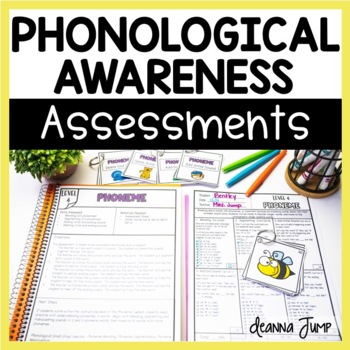Phonological, Phonemic Awareness Assessment, Science of Reading Phonics Screener
- Zip
What educators are saying
Description
Are you looking for a Science of Reading aligned phonological and phonemic awareness assessment? This progress monitoring toolkit aims to assess and guide phonological & phonemic awareness instruction. These oral assessments are easy to administer and the picture cards make the assessments fun & engaging for students.
Assessments and data collection sheets are provided for each area of Phonological Awareness. Each area of Phonological Awareness includes skills that increase with the level of difficulty.
- Print Concepts there are four assessments (Letter Identification of Uppercase letters, Letter Identification of Lowercase Letters, Letter Sound Knowledge, Concept of Spoken Word).
- Syllables there are six assessments (Compound Words, Compound Word Deletion, Compound Word Substitution, Blending Syllables, Segmenting Syllables, Syllable Deletion).
- Onset-Rime there are six assessments (Blending, Segmenting, Onset Identification, Rime Identification, Onset Substitution, Rime Substitution).
- Phonemic Awareness (Phoneme) there are six assessments (Phoneme Blending, Phoneme Segmentation, Adding Initial Sounds, Adding Ending Sounds, Initial Sound Deletion, Ending Sound Deletion).
- Phonemic Awareness (Advanced) there are six assessments (Phoneme Segmentation, Adding Initial Sounds, Adding Ending Sounds, Initial Sound Deletion, Ending Sound Deletion, Sound Substitution).
- Spelling Assessment there are five different levels and lists for the spelling assessments. Level 1 begins with an alphabet assessment where the students write the letters that represent the alphabet sounds. Level 2 Initial Consonants, Initial Digraphs, CVC Word Families. Level 3 Initial Consonants & Digraphs, Word Families. Level 4 Initial and Ending Blends & Digraphs, R-Controlled Vowel Level 5 Long Vowel Word Families & advanced vowel patterns
These assessments were not designed to be administered all in one sitting, rather the teacher should choose where they believe the student is at and start from there. The teacher can choose to move up or down in level of difficulty if needed. The picture cards are meant to anchor student thinking and focus the students’ attention on the word they will be working with, however, most of the assessments can also be completed without the picture cards if you so choose.
Mastery of all the skills is not expected in K-1, and these assessments should be viewed as a continuum and a guide to supporting each student’s individual growth in phonological awareness.
This resource aligns with the following resources:
PHONOLOGICAL AWARENESS SMALL GROUP LESSONS
Phonological & Phonemic Awareness Complete Program for K
Phonological & Phonemic Awareness Complete Program for 1st & 2nd grade
SKU: 8040717





